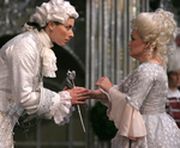Vancouver Opera
Der Rosenkavalier
by Richard Strauss
Libretto by Hugo von Hofmannstahl
In German with English surtitles
Date: 16, 19, 21, 23 October 2004 Venue: Queen Elizabeth Theatre
Reviewer: Elizabeth Paterson
Conductor Jonathan Darlington Director David Gately Chorus director Leslie Dala Set designer Elizabeth Dalton Lighting Harry Frehner
Cast: The Marschallin Carol Wilson Octavian Beth Clayton Baron
Ochs John Cheek SophieTracy Dahl von Faninal Jon
Fanning
 On
Saturday night,
Jonathan Darlington led Vancouver Opera's production of Richard
Strauss's most
popular opera, Der Rosenkavalier in
a
performance redolent of Vienna, as rich and complex as a chocolate mousse. Leaving
the exoticism of Salome and the dark psychological deeps of Elektra, Strauss and von Hofmannsthal turned to the golden days
of
the mid 1700's. The music is full of
tunes and packed with waltzes in homage to Vienna's great musical history,
Mozart in the 18th century, and in the 19th, Schubert, Lanner, and the other
Strauss family.
On
Saturday night,
Jonathan Darlington led Vancouver Opera's production of Richard
Strauss's most
popular opera, Der Rosenkavalier in
a
performance redolent of Vienna, as rich and complex as a chocolate mousse. Leaving
the exoticism of Salome and the dark psychological deeps of Elektra, Strauss and von Hofmannsthal turned to the golden days
of
the mid 1700's. The music is full of
tunes and packed with waltzes in homage to Vienna's great musical history,
Mozart in the 18th century, and in the 19th, Schubert, Lanner, and the other
Strauss family.
The opera opens in the happiness and fun of being in love, in that space between waking and breakfast. Octavian (Beth Clayton) is played with passion and zest for life, and the heedlessness of being 17. The Marschallin (Carol Wilson) is as happy, though more aware. Carol Wilson was always elegant and graceful and never less than a princess. Both singers were in excellent form with lovely phrasing and control and, especially, warmth.
Octavian whisks into hiding when they are interrupted. The Marschallin's boorish cousin is up from the country to pick up a rich wife in return for his noble name. John Cheek resisted the temptation to play him as a boisterous buffoon and gave us a forthright character, as confidently rude as only an aristocrat can be.
The Baron has come to ask the Marschallin to choose a suitable person as his envoy, carrying a silver rose to Sophie von Faninal, his fiancée, part of the old ritual of a formal engagement. While they talk he flirts openly with the "chambermaid" Mariandel, who is none other that Octavian in disguise. Without losing her composure, and with her eyes wide open, the Marschallin proposes Count Rofrano as the envoy, again, none other than Octavian.
Of course, when Octavian presents the rose to Sophie it is love at first sight. Sophie von Faninal, even younger than Octavian, is straight from the convent and with stars in her eyes, the daughter of a dubious, but very rich, businessman.
Beside the Marschallin she might seem insipid, but Tracy Dahl invested Sophie with disarming frankness and enthusiasm. By the end of the opera, she is ready to grow up. Sophie's journey is written in the words and music, but its lively interpretation is through Tracy Dahl'scharacterization and artistry.
In short order, the Baron behaves rudely, Sophie is shocked at the reality of a crude and lusty older man as a husband and Octavian fumes and finds an opportunity for a fight that wounds Ochs. The house is thrown into an uproar, Octavian leaves, Sophie refuses to marry the Baron, her father threatens her with the convent, and the Baron gets a letter from "Mariandel," arranging an assignation.
Naturally, he falls into the trap and arrrives at the inn where Octavian has arranged for disturbances to occur. "Mariandel" plays hard to get; there are faces in the wall and vanishing figures; a "deserted wife" with children in tow shows up; the police come and eventually even the von Faninals. At the height of the chaos, when Octavian has changed into his own clothes, the Marschallin arrives to take charge.The police are squared, the Baron sent home, and order is restored, but Octavian is torn between past and future. Sophie believes she is lost. Only the Marschallin can choose and she chooses to give.
Carol Wilson sang with restrained, deeply felt emotion, without either sentiment or cynicism. Her mood of melancholy beautifully set off the final joyous duet of the young lovers.
The ensemble work of the cast was uniformly good from the smallest boy (Jordan Sidoo) upwards. John Fanning was an anxious upwardly-mobile von Faninal and Nancy Hermiston threw herself into the part of Annina, one of a pair of Italian "fixers." The sets and costumes (from the Canadian Opera Company) were sumptuous and apt.
At all times, there were strong connections amongst the characters. They all played against each other well and were thoroughly engaged with the music, their characters, and the work as a whole. Strauss and von Hofmannsthal are among the great artists of their time. They deserve the best a performer can give -- and they got it.
© 2004 Elizabeth Paterson